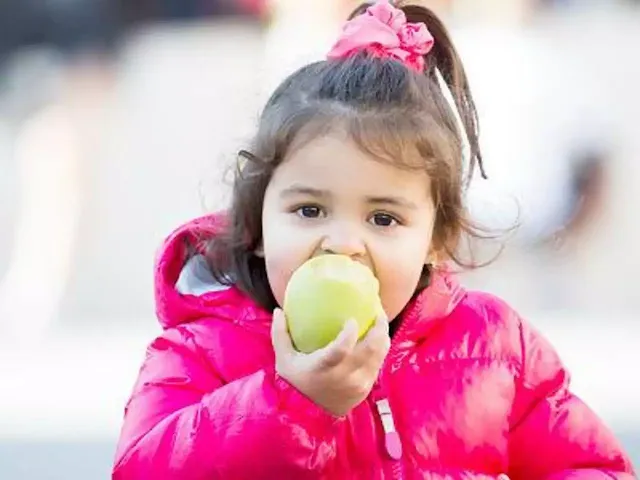Iron is a crucial vitamin that you may already be aware is vital for women, particularly those who are expecting and nursing, but it is also crucial for kids' growth and development throughout their initial year and beyond!
Making hemoglobin, a crucial component of RBCs that distributes oxygen throughout the body, requires iron, an important vitamin. A lack of iron prevents our systems from producing enough red blood cells, which in turn prevents our tissues and organs from receiving enough oxygen, both of which are essential for proper growth and development. According to expert dietitians, infants with iron deficiencies may face delays and impairments in their cognitive and behavioral development. Hence it is pivotal to give iron supplements to weak babies and preterm infants.
Make Sure Your Baby Is Getting Enough Iron
Breastfed infants can absorb iron from breast milk during the first six months of nursing. Iron insufficiency can occur in newborns of lactating women who are anemic or iron deficient.
The first foods introduced to infants should be iron-fortified after they reach 6 months old, a period of fast growth and the beginning of solids. A Baby's anemia can be avoided with a diet high in foods containing iron. As per studies, 11 mg of iron per day is the recommended dietary intake for infants between the ages of 7 and 12 months. A pediatrician can examine your child's hemoglobin levels if you think they could have anemia, which can cause weariness, irritability, and shortness of breath.
According to experts, babies typically have adequate iron reserves to last 4 to 6 months. A baby's iron requirements will be satisfied once solid meals with added iron are provided. Also, iron supplements must be given to babies when required.
Typically, single-grain cereals are initially introduced as solid food, followed by veggies, fruit, and meats. Offering meat can also assist supply better protein, iron, and zinc levels. Most single-grain cereals are enriched with iron and would be a great source of iron for newborns. Consider the following to boost iron content in your little munchkin.
● Iron-Fortified Formula (Standard Cow's Milk Formula)
Iron-fortified formulas are available for infants 6 months and older, but they're often not the best choice for infants under 6 months. While infant formulas do contain iron, they are also loaded with fiber, which is important for an infant's health. Infants need a variety of nutrients from food and from breast milk to grow and develop. Iron is one nutrient that should be added after 6 months of age when an infant needs various nutrients to grow and develop normally.
● Dark Leafy Greens (Spinach, Kale)
Spinach, kale, and collard greens are good sources of vitamin C, which helps your baby absorb iron in his or her diet. Leafy green vegetables are also high in vitamin K, which helps your baby absorb iron in his or her diet. Vitamin K also may help prevent blood clots later in life by helping blood cells move freely through your body.
● Apricots
Apricots are one of the best ways to get iron in your little one's diet. They are high in vitamin C as well, which helps boost the absorption of iron from food. Apricots are also a good source of vitamin A, which helps fight infection and supports healthy vision development.
● Prunes
Prunes are another good source of iron for babies. They have about 1mg of iron per 100g of fruit and 0.8mg of iron per 100g of dried fruit. You must give little prunes on alternate days to your kid to fulfill their iron requirements.
● Raisins
Raisins, which are made from grapes, contain vitamin B2, iron and copper, as well as other minerals. They are also a good source of dietary fiber, which helps to maintain a healthy digestive system. Raisins are high in calories and fat, so they should be given in moderation when you're trying to encourage your little one to have an iron-rich diet.
● Peas
Peas are a great source of iron content in your child's diet. They also contain vitamin C, folate and potassium – all essential nutrients for growing children. Peas are low in calories but high in protein and fiber, making them a nutritious choice for toddlers who need more iron in their diets. You can buy fresh or frozen peas for your kid's meals or add them to soups or stews, as well as pasta dishes like spaghetti bolognese or macaroni cheese.
● Legumes, Lentils and Other Beans
Legumes such as beans and lentils provide a good source of iron for growing toddlers, as well as protein and other nutrients such as calcium and folate (vitamin B9). Legumes also contain phytoestrogens that can help alleviate the risk of several types of cancer.
● Red Meats
Beef
and lamb are two of the most iron-rich foods you can eat. A 3-ounce serving of
lean beef or lamb contains about 15 mg of iron, which is more than half of what
your child needs in a day. Red meats also contain other nutrients such as
protein, B vitamins and zinc for brain development.
● Iron-Fortified Cereal
Iron-fortified cereal is one of the best ways to boost iron content in your baby's diet. Iron-fortified cereal can be found in most grocery stores, but make sure you read the label before buying any cereal with added iron. Some cereals have too much-added sugar or salt, which can cause problems with your little one's digestion.
Wrapping Up-:
These foods can really help to elevate iron in babies and boost their overall growth. But, still, if children do tantrums and you think your toddler isn't consuming enough foods that contain iron, consider taking an iron supplement instead! Iron supplements for babies come in various forms; however, the liquid is best to consume because it is easy on the tummy. Hope you find the information useful. Stay tuned to get more information on nutrition and health.











0 Comments